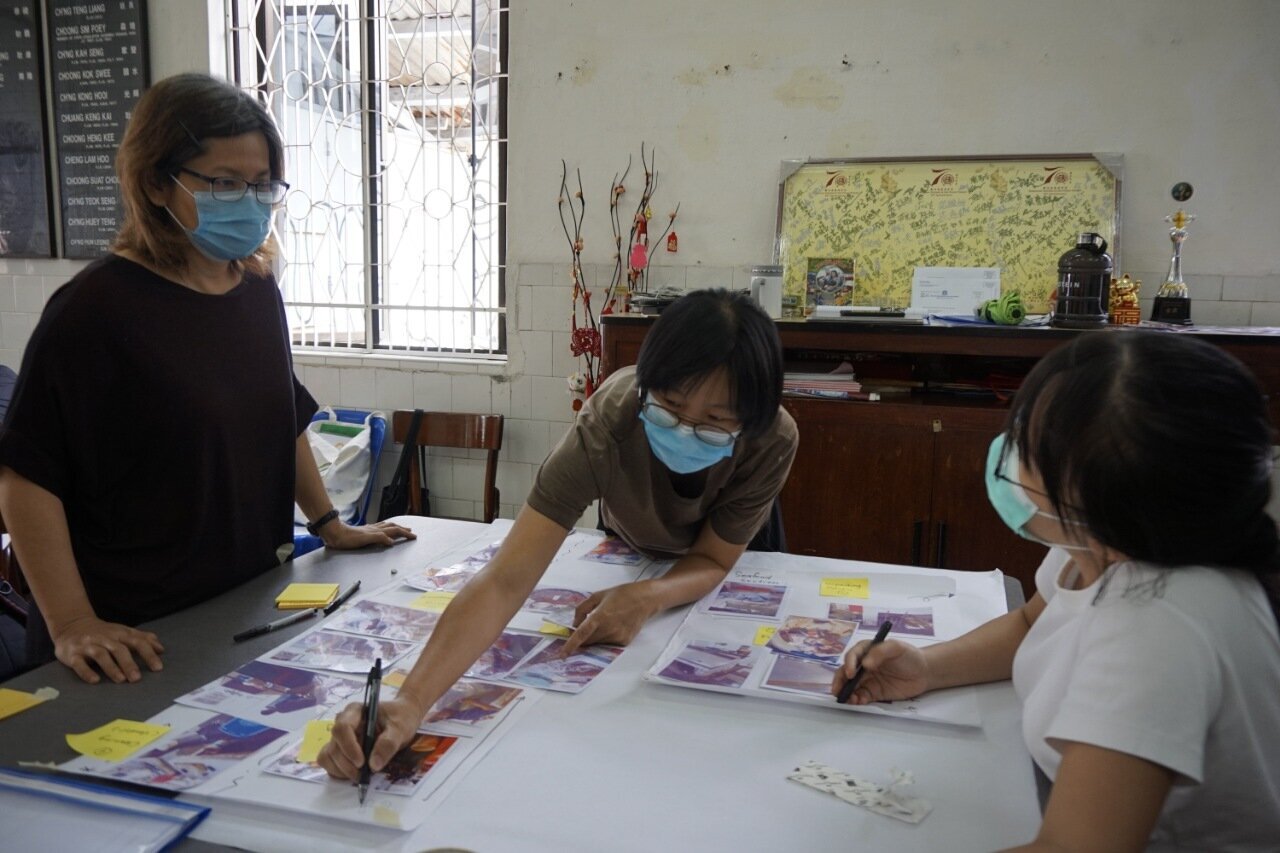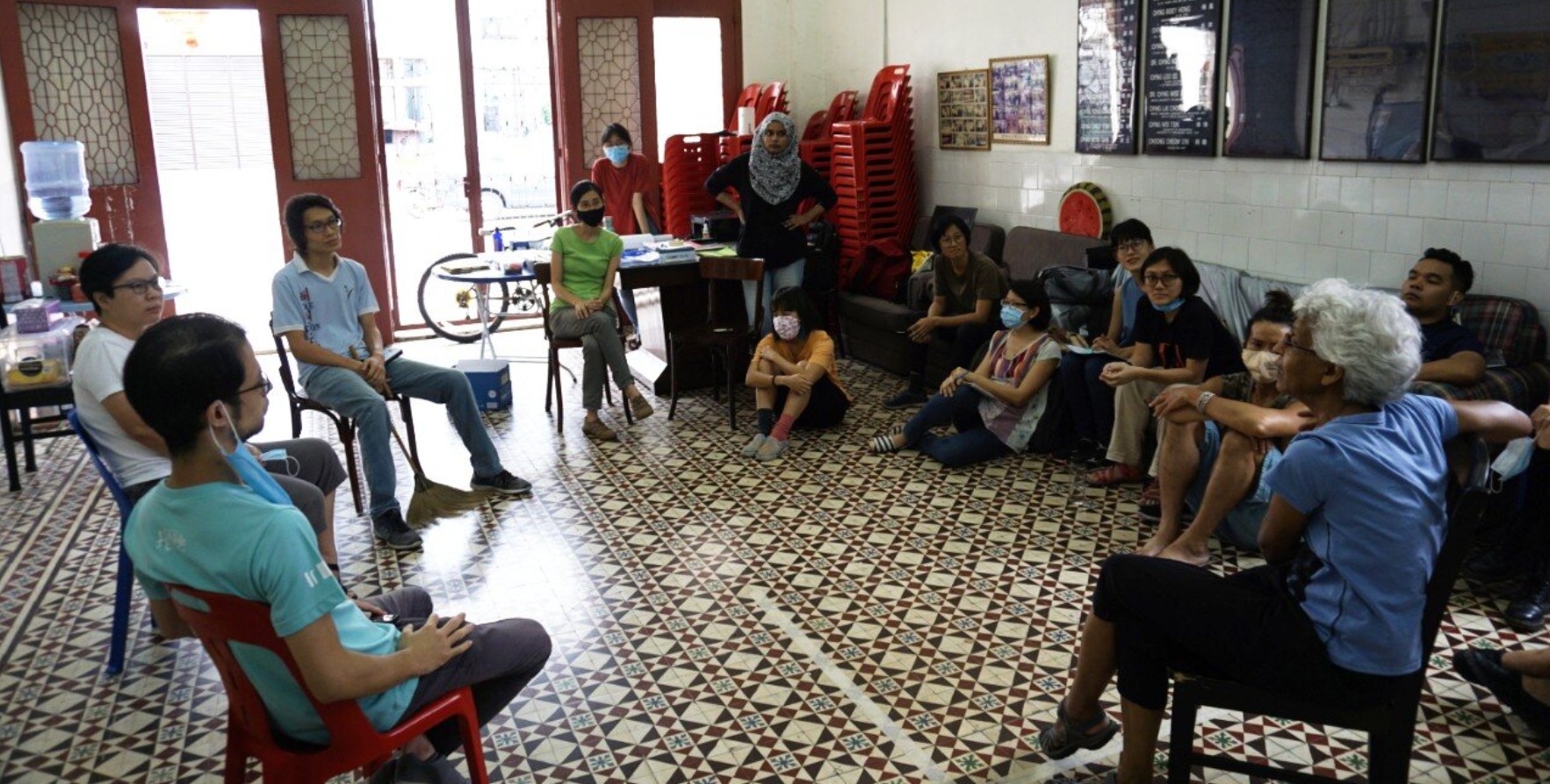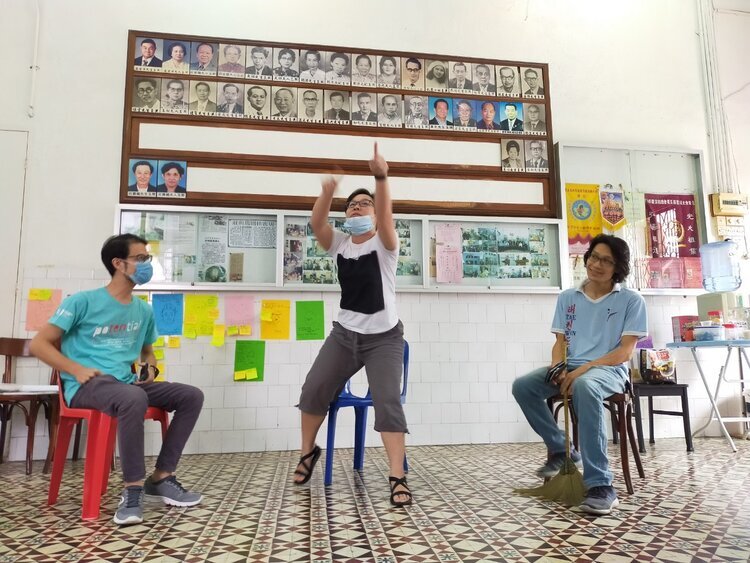Community-Engaged Arts Training: Building Capacity, Fostering Community
This year, Arts-ED launched the inaugural Community-Engaged Arts: Connecting People through Creative Approaches training workshop with the aim of cultivating a community of practitioners who employ artistic and creative approaches for social or educational transformation. It has brought together 17 cross-sector professionals, including artists, cultural workers, and educators, on a learning journey of planning, designing, and implementing community-engaged arts (CEA) projects.
The training consists of three parts:
Part 1: Online Training on Concepts, Case Studies, and Reflection
Part 2: On-site Training on Hands-on Tools and Strategies
Part 3: Project Application in Two Community Sites (Selangor and Penang)
PART 1: ONLINE TRAINING - Lectures and Case Studies Sharing
From May 12th to 15th, the participants gathered (virtually) for the first time to get to know one another and develop a conceptual foundation of the correlations between place, community, and culture in the context of CEA practice. Through lectures and small-group exercises, the trainer-facilitators engaged the participants in understanding and critically reflecting on different approaches to community-based interventions, the challenges involved, and related ethical concerns. Local and international practitioners were also invited to present on their CEA projects. The case studies they shared demonstrated the remarkable breadth of existing ways in which the arts are used to facilitate change in various communities and societal contexts, encouraging the participants to think creatively and intentionally about their own CEA undertakings.
Group photo with speakers from Indonesia and Taiwan on Day 3 of online training.
PART 2: ON-SITE TRAINING (PENANG)
While we had to shift the theoretical component of our training online due to the COVID-19 pandemic, we were glad to still be able to run in-person sessions that allow participants to get hands-on experience in planning community-based arts and culture projects. Considering their geographical spread, the participants were split into two groups that are based in Penang and Selangor respectively, which are also the locations for their on-site training and subsequent project application.
The group in Penang recently completed four days of on-site workshops from June 24th-27th in George Town. 10 of them, including creatives specialising in various mediums and educators, came together and undertook activities such as a baseline study and cultural mapping at the Chowrasta Market, their project site. The group sought to understand the assets and dynamics in the community, with guidance and feedback along the way from Arts-ED’s trainer-facilitators.
Day 1 - Forming the CEA Team Roles and Baseline Study
The workshop started off with some team-building exercises for the participants to get to know everyone’s strengths and skills better and think about how they could complement each other in forming a CEA project team. Community connector, researcher, coordinator/manager, facilitators, artist/creatives, programmer, and documenter are some of the roles needed.
With a trainer-facilitator’s guidance, the participants reflected on the capacities they believed they could fulfil as a director, thinker, supporter, or socialiser on the team.
Primarily, the focus of the day was on understanding the roles of the different parties in a community-engaged project and the relationships among them. This laid important groundwork as the participants dived into conducting a baseline study on Chowrasta Market, through means such as online research and site visit.
A trainer-facilitator led the group on a guided tour of the market to help familiarise them with the site.
Day 2 - Identifying a Focus Area and Cultural Mapping
Having established a foundational understanding of Chowrasta Market and initial focus areas, the participants went deeper into the project planning process on the second day. The Arts-ED team introduced the participants to cultural mapping.
Pn. Rohaya, Operations Manager of IM Global Property Consultants Sdn. Bhd. which manages the Chowrasta Market, took the participants around the market and explained some issues the management has identified
After trying out several stages of the mapping process themselves, the most significant takeaway of the day for the participants seemed to be the importance of being clear about their own intentions and objectives behind every decision made, from the questions asked in interviews to the techniques selected for data visualisation. The visualised data then were used for assessment of the strengths, weaknesses, opportunities, and threats of the focus area to brainstorm possible interventions.
Day 3 - Tools and Strategies for Community Engagement
Into the second half of the on-site training, participants learned about several creative approaches to engaging the community as change agents.
An example provided was photography. As an accessible and effective visual storytelling tool, taking photos is one way in which community members can identify and demonstrate issues in their surroundings themselves.
Working in small groups, participants mapped the issue of waste management at Chowrasta using photos.
The trainer-facilitators also introduced a few dialogical platforms - such as perspectives-gathering session and stakeholder consultation - to the participants via role-play.
Participants and facilitators simulating an exchange of perspectives among a cleaner, a vendor, an IM Global staff member, and a councillor.
Day 4 - Use of Creative Approaches, and the Planning and Management of a CEA Project
On the last day, participants brainstormed some possible interventions for their project, reflecting on the unique potential of artistic or creative approaches in fostering community participation.
Participants discussing ideas for creative intervention as a big group.
Perhaps their learning over the course of the 4 days can be best captured by an exchange between Arts-ED’s founder, Janet Pillai and a participant in the final group reflection session. Janet posed a deceptively simple question - what are some creative mediums one can possibly use in CEA projects - to which a participant who is a dancer tentatively answered, “movement”.
Indeed, as Janet remarked, at the heart of CEA is the conviction that the arts need not - and should not - be limited to specific, established art forms that are fenced off by conventions. Instead of painting or photography, the medium is visual arts. Instead of dance or a particular genre of dance, the medium is movement. The arts are much more embedded in our seemingly mundane daily lives than we often realise. The question is how we can creatively and strategically leverage this intimate relationship between the arts and our lives to build sustainable communities - a question that this workshop hopefully helps prepare the participants to answer.
Looking ahead, we will be conducting on-site training in Selangor from July 1st-4th, and both groups in Penang and Selangor will be finishing their respective project proposals in the next two weeks with the goal of executing their projects between July and October. We will all gather for a final evaluation and reflection session after the project completes in November. We are excited about the learning and discoveries the rest of this training will bring for the participants as well as ourselves!
This training workshop is made possible by our community partner, Yayasan Hasanah.
Arts-ED Trainer-Facilitator Team: Janet Pillai, Chen Yoke Pin, Foo Wei Meng
Reported by: Ooi Win Wen, 29 June 2020









